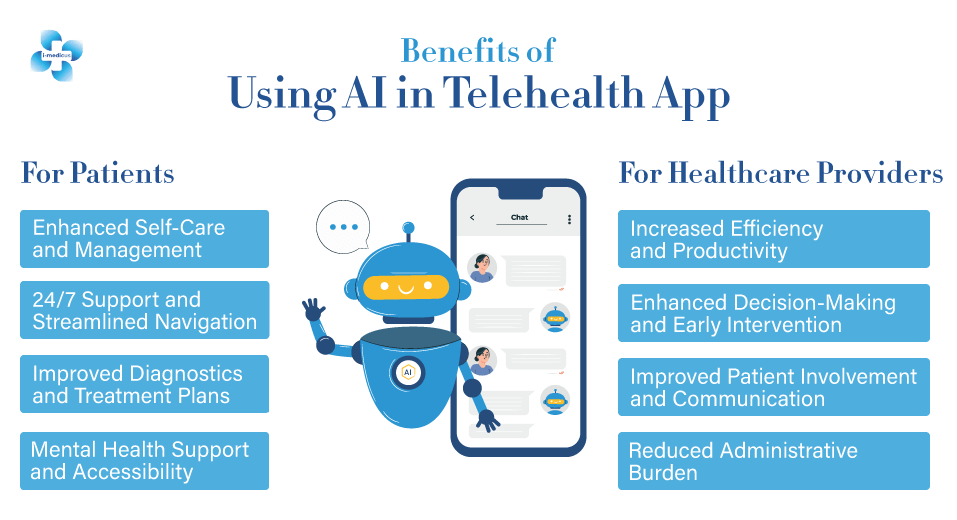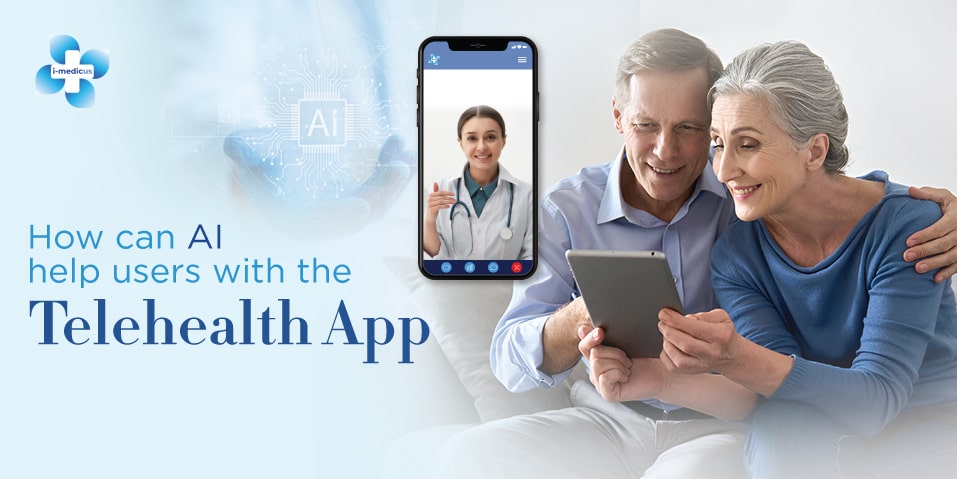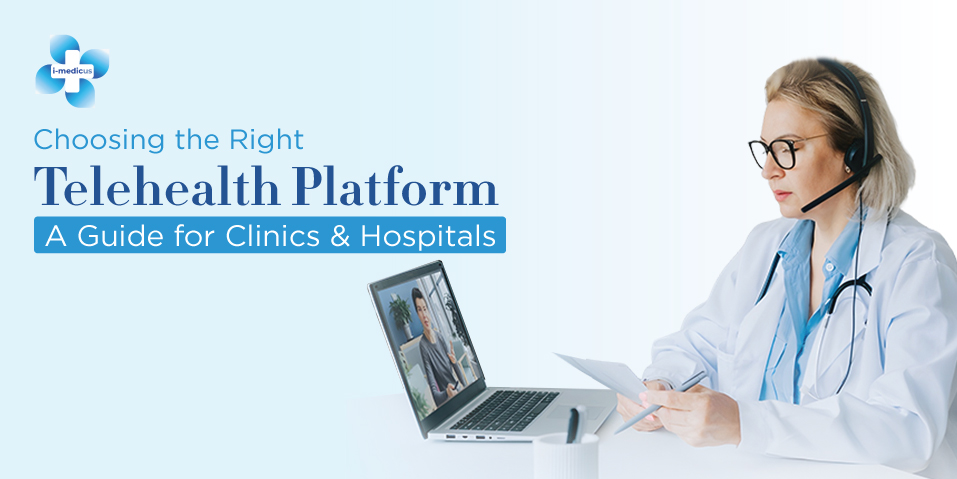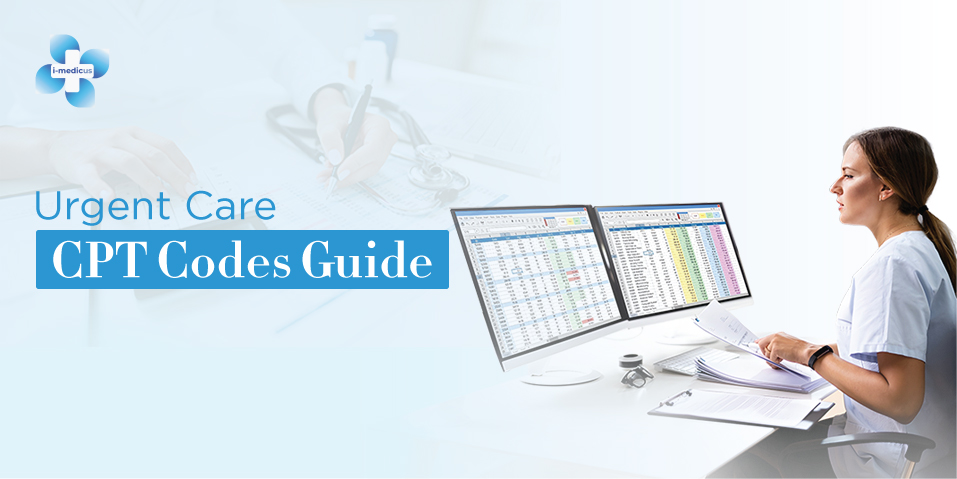Artificial intelligence is quickly changing the virtual Telehealth app through its integration with telehealth technologies. By utilizing AI’s analytical and learning capacities, telehealth applications may surpass simple video consultations and provide a more extensive and customized user experience. This innovative breakthrough in i-medicus improves the efficacy and efficiency of telehealth services while enabling patients to play a more active part in their health management.
Let’s take a closer look at the particular ways in which AI might help telehealth app users, thereby improving their health experience. We’ll look at how AI may be used to give real-time health data analysis, automate symptom checking, customize appointment scheduling, and even create chatbots that can assist with mental health. Telehealth applications have the potential to become effective instruments for continuous health management, early illness identification, and preventative care by utilizing AI’s capabilities.
Recent Market Size of AI in the Healthcare Industry
As we look at AI technology in the healthcare industry, investors are approaching better integration and more refined services to cater to patients’ needs. Last year, 2003, the net worth of AI in the healthcare industry was valued at $21.68 billion.
The surprising fact is that the growth of AI in healthcare is estimated at 38.1% CAGR, which will increase after 2025. Experts believe that by 2031, the AI market in the healthcare industry will reach $286.77 billion.
Market Trends of AI in Telehealth App
A new wave of innovation with i-medicus Telehealth service is enhancing user experience with smart AI integration in healthcare apps. Let’s examine some major market trends influencing this rapidly diverging environment:
1. Enhanced Self-Care and Patient Engagement:
· AI-driven symptom checkers can provide consumers with an initial evaluation of their health issues. It enables them to decide whether to seek further medical care or not.
· Active self-care and preventative steps can be encouraged by personalizing health suggestions derived by AI analysis of a user.
· AI chatbots may improve the patient experience by providing them with 24/7 assistance. Now, patients can request urgent queries and set up appointments.
2. More Accurate Diagnoses and Treatment Recommendations:
· Healthcare professionals may benefit from AI-powered analysis of X-rays, medical pictures, and other data sets to make more precise diagnoses and treatment plans.
· Early intervention and better clinical results are made possible by machine learning algorithms’ ability to recognize trends and anticipate possible health hazards.
· To encourage early intervention in mental health disorders, AI chatbots with mental health support skills can give basic mental health resources and conduct preliminary tests.
3. Simplified Administrative Workflows:
AI-enabled virtual assistants may handle routine administrative duties, such as organizing appointments, obtaining medication refills, processing insurance claims, and giving medical professionals more time to attend to patients.
· By analyzing patient medical information and producing automated reports, Natural Language Processing (NLP) technology may increase productivity and data accuracy.
4. Personalized Communication and Patient Education:
· Based on a user’s unique health requirements and circumstances, AI chatbots may provide personalized health information and educational resources.
· Thanks to AI-powered translation services, language barriers can be eliminated, and diverse communities can have equitable access to telehealth solutions.
5. Changing Data Security and Regulatory Environment:
· Strong data security measures and well-defined rules are essential to guarantee user privacy and ethical data handling as AI integration in healthcare apps continues to increase.
· It is anticipated that regulatory frameworks will change to handle new ethical issues and guarantee ethical AI growth in the medical field.
Benefits of Using AI in Telehealth App
The use of artificial intelligence in healthcare apps is quickly becoming a reality. This connection provides several benefits to both patients and healthcare practitioners, eventually changing the way we approach virtual healthcare. Let’s look at some significant benefits for patients and doctors:

For Patients:
- Enhanced Self-Care and Management: With AI-powered symptom checks and individualized health suggestions, patients can take control of their health. It will provide insight into individual concerns and grant early action for better health results.
- 24/7 Support and Streamlined Navigation: AI chatbots offer continuous assistance by answering common queries, arranging appointments, and directing users via the app. It leads to quick navigation and more accessible support.
- Improved Diagnostics and Treatment Plans: Artificial intelligence can evaluate medical data and photos that help healthcare experts make more accurate diagnoses. It also helps them customize treatment plans according to individual requirements which results in better clinical results.
- Mental Health Support and Accessibility: AI chatbots may do preliminary tests for mental health issues and give basic information. Furthermore, AI-powered translation eliminates language barriers, providing greater access to healthcare services.
For Healthcare Providers:
- Increased Efficiency and Productivity: Artificial intelligence automates processes such as appointment scheduling, medication refills, and report production, freeing up critical time for patient interactions and complex medical situations.
- Enhanced Decision-Making and Early Intervention: AI analysis of patient data helps in spotting trends, forecasting future health problems, and assisting healthcare practitioners in making faster and more informed choices. It supports early intervention and perhaps improved preventative care.
- Improved Patient Involvement and Communication: AI chatbots may provide personalized health education materials tailored to individual illnesses, resulting in greater patient knowledge and involvement in their healthcare journey.
- Reduced Administrative Burden: Artificial intelligence simplifies administrative work, allowing healthcare practitioners to focus on providing excellent treatment and building deeper patient connections.
What is the average cost of Integrating AI Software in Telehealth Apps?
Integrating AI software in a Telehealth app will, on average, cost around $30,000 to $70,000. However, it also depends on the complexity of the domain and the platform it was built on. If you need more advancement in the design and layout of the software, then the price may vary as per the client’s requirement.
Future of AI in Telehealth App
Looking into the Future of Telehealth, the potential for AI in healthcare apps is nothing short of transformational. We should expect increasingly more powerful AI-powered symptom checkers with advanced diagnostic capabilities, perhaps enabling earlier illness identification and intervention. Furthermore, AI integration with wearable devices might give real-time health monitoring, allowing clinicians to treat any abnormalities before they worsen.
AI chatbots have the potential to transform mental health by offering more comprehensive assistance. They can personalize treatment sessions and mental health treatment tools. As AI technology advances and adapts, the future holds the promise of virtual healthcare assistants that can not only answer questions but also engage in more complex discussions. Here, patients can talk about their health and understand the best approach to cope with their medical condition.
Conclusion
AI is no longer a distant dream in telemedicine solutions. AI promotes a more proactive and customized healthcare experience by providing patients with self-care tools, facilitating communication, and improving provider diagnoses. The benefits of 24/7 assistance and symptom monitoring for patients, as well as enhanced decision-making and workflow efficiency for doctors, are apparent. As AI technology advances and laws change, the future of telehealth applications offers empowered patients, enhanced medical delivery, and a more proactive approach to health management for everyone. This potent combination of AI and telehealth opens the way for a more accessible, efficient, and customized healthcare environment, eventually changing the way we approach health and well-being.
FAQs
1. How would an AI-powered telehealth app help me better manage my health?
AI-powered symptom checkers and tailored health suggestions can help you discover possible problems and take proactive actions to improve your self-care. Additionally, AI chatbots can answer your queries 24/7 and help you through the app, making it easier to manage your health from the comfort of your own home.
2. Can artificial intelligence (AI) replace my doctor during a telemedicine appointment?
Not presently, AI telemedicine is intended to aid physicians, not replace them. It can analyze data, make diagnostics, and even provide rudimentary mental health assistance via chatbots. However, complicated medical judgments and treatment regimens need a doctor’s knowledge and personal touch.
3. Is the AI in healthcare applications secure?
Security and privacy are important considerations for AI-powered technologies. To protect personal health information, reputable telehealth services must implement strong data security measures and follow stringent laws.
4. What are the limits of AI in telehealth applications?
AI is still evolving. It is very hard to determine the limitations of AI and the necessary way to train it to opt for the best output. Furthermore, AI cannot duplicate the subtle human contact and sensitivity that physicians bring to patient care.
5. Who will gain more advantages from AI in telehealth applications?
Everyone may benefit! AI can increase remote healthcare access, provide 24/7 assistance to busy clients, and enable patients to take an active role in their health management. Additionally, AI can help doctors provide more efficient and individualized treatment.








